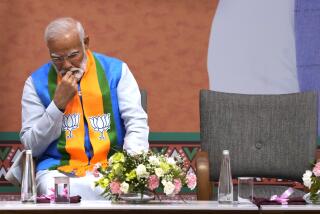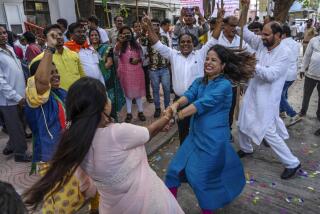The Party’s Over for India’s Congress
- Share via
NEW DELHI — There was a time when politics in India was the Congress, and the Congress was politics.
The Indian National Congress party was the locomotive powering the independence struggle, political instrument of luminaries such as Mohandas K. Gandhi and Jawaharlal Nehru. The party ultimately marshaled one of the world’s most diverse populations--landlords and poor peasants, Hindus and Muslims, Brahmins and untouchables--and mitigated and reconciled their demands.
“There are three things every Indian knows,” party spokesman V. I. Gadgil is fond of saying. “The red letter-box of the post office, the voice of singer Lata Mangeshkar and Congress.”
The comeuppance for the longtime ruling party came this month, when Indian voters gave it its lowest score ever in national elections.
Battered for the first time in both northern and southern India, the party commonly known as Congress (I) now has only a single large state, Madhya Pradesh, in its hands.
For the first time, it lost its habitual spot in Parliament as India’s largest party. But for a decade and a half, the signs of decay had been evident.
“Congress is a very old party, and a 110-year-old party doesn’t die. But it certainly fades away,” said Ajoy Bose, an editor for the Pioneer newspaper.
A constellation of causes brought about Congress’ decline. Among them are loss of vision, pervasive corruption, internecine rivalry and mediocre leadership.
Most significantly, as Indian society has splintered along caste, communal and regional lines, Congress has been unable to maintain its role as a clearinghouse for the hopes and demands of virtually all segments of the population.
“Congress was like a pandal, a great tent set up to welcome guests to Indian marriages or other functions,” said Pran Chopra, senior researcher at the Center for Policy Research, a New Delhi think tank. “But next door, politicians from various castes or the Muslims eventually pitched their own tents and began to tempt the guests away.”
The Hindu nationalist Bharatiya Janata Party, which surpassed Congress as the top party in Parliament, has lured away many traditional Congress constituencies in northern and western India. It now boasts a younger, more educated and more urban electorate than its rival, said V. B. Singh, senior researcher at the Center for the Study of Developing Societies.
The BJP “has all the attributes of the party of the future,” Singh said.
Muslims, India’s single biggest minority and a longtime Congress “vote bank,” have abandoned the party en masse, along with many untouchables and other low-caste constituencies that traditionally supported Congress.
All this has led to the end of what Indian political scientist Rajni Kothari terms the “Congress system,” where public business was transacted not in the institutions of government but by rival wings and power blocs inside the party that ruled India for 30 uninterrupted years after independence in 1947.
“That system, for all practical purposes, has collapsed,” Kothari said. “And a real alternative has not yet emerged.”
By 1991, after it had been out of power for only the second time since independence, Congress’ standing with voters had dropped so much that even the “sympathy wave” kicked up by former Prime Minister Rajiv Gandhi’s assassination wasn’t sufficient to secure it a workable majority in Parliament.
Congress members confidently note that their collective obituary has been written before and that things are not so bad. Though the recent election was the first in which Congress was bested by a single party and not a conglomerate of its foes, India’s winner-take-all electoral system exaggerated the damage.
The BJP may have wound up with more seats in Parliament, but Congress still received 31.5% of the popular vote, more than any other party.
And Congress retains so much clout in a deadlocked Parliament that it could dictate terms to a coalition partner or combine with it to form India’s next government. But a further withering of the power and influence of the party that once seemed synonymous with India seems inevitable.
“The grand old party which held India together for close to half a century, by means fair as well as unfair, in shine and in darkness, is now a shambles,” said Bhabani Sen Gupta, a former senior fellow at Columbia University who has written an acclaimed book on the problems of governing India. “Its leadership is palsied and degenerated, its moral fiber is broken, it no longer has a message, a vision, a dream for Indians.”
More to Read
Sign up for Essential California
The most important California stories and recommendations in your inbox every morning.
You may occasionally receive promotional content from the Los Angeles Times.













